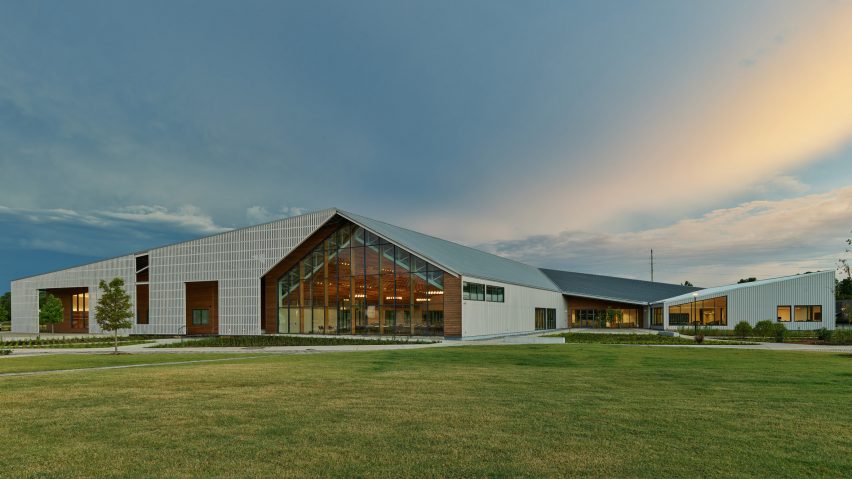American studio Eskew Dumez Ripple has used features of vernacular architecture in creative ways to form a sustainable, multipurpose school building.
The Home Building is part of the Thaden School, a private school in Bentonville, Arkansas, that serves students in grades six to 12.
With a focus on learning by doing, students engage in activities such as filmmaking, constructing bicycles, and growing and preparing food.
The school is backed by the Walton Family Foundation, which is led by the founders of the retail giant Walmart.
The school's 26-acre (10-hectare) campus was master-planned by Eskew Dumez Ripple – a studio based in New Orleans, Louisiana – in collaboration with local firm Marlon Blackwell Architects, landscape architects Andropogon and engineering firm CMTA.
Eskew Dumez Ripple was tasked with designing the Home Building – a 34,000-square-foot (3,159-square-metre) facility that holds a dining hall, teaching kitchen, bookstore, library and lounge/study spaces.
"The Home Building serves as both the social and spiritual center for students," the architects said.
While designing the facility, the team took cues from the area's pastoral heritage, including its vernacular architecture.
"The design reconciles seemingly contradictory notion: lofty ambitions for the building's design with the humble nature of local, vernacular architecture," the firm said.
Zigzag in plan, the wood-framed building stretches across the site, bending at several points to create porches and courtyards.
Facades are clad in shiplap cedar siding and board-and-batten siding made of white, fibre-cement Hardie panels.
The building's different parts are topped with either single-slope or gabled roofs, all of which are covered with standing seam metal.
Within the building, the team used basic finishes such as concrete flooring and white-painted sheetrock, and incorporated special accents like custom millwork in the study hall and a live-edge wooden table in the teaching kitchen.
At the heart of the facility is the dining room, which rises to 38 feet (12 metres) at its highest point and features a glazed wall. Hung from large, exposed trusses is a gabled, slatted canopy made of poplar wood.
"The design employs common materials and methods in uncommon ways," the team said.
The building has a number of sustainable features, including low-flow plumbing fixtures, a geothermal well and an energy recovery wheel.
Rainwater is collected and stored in a pond, or "water lab", that serves as a teaching tool for students. The landscape is filled with native species like prairie grass and pecan trees.
"Sustainability is placed at the forefront of the students' education, and the landscape functions as a botanical textbook rife with plants that represent a microcosm of the region's native species," the team said.
With plans to install a photovoltaic array in the future, the building is designed to achieve an Energy Use Intensity score of 23. A score of 25 or less for a school building indicates that the building is "zero energy ready", according to the architects.
The Home Building at Thaden School was a recipient of the 2022 AIA Architecture Awards.
Other projects there include the Crystal Bridges Museum of Art, designed by Sadie Architects, and a co-working, dining and recreational venue by Brand Bureau and Modus Studio that is located within a former industrial building.
The photography is by Tim Hursley and Dero Sanford.
Project credits:
Architect: Eskew Dumez Ripple
Landscape architect: Andropogon Associates
Civil engineering: Ecological Design Group
MEP engineering: CMTA Consulting Engineers
Structural engineering: Engineering Consultants
Project management: Aegis Property Group | WEI
General contractor: Milestone
Irrigation: Aqueous
Signage and wayfinding: Tom Zetek

